Meditation isn’t only about the mind—it’s also about the body. And believe it or not, meditation isn’t meant to be physically uncomfortable. Getting your posture right is key to staying relaxed and alert instead of tense or spaced out. Without that, it’s nearly impossible to focus on the present moment.
Chances are that when you start, meditation will feel a little awkward or uncomfortable. That’s okay. Finding the ideal meditation posture and seating arrangement can take a while. There’s no one-size-fits-all approach—it takes time to familiarize yourself with the subtleties of your unique body. We offer the basic guidelines to help you get started or make some tweaks.
Posture Pointers
- EYES gaze slightly downward, 4 to 6 feet in front of you. Or eyes closed.
- CHIN slightly tucked to keep your cervical spine aligned.
- SPINE follows natural curvature—upright, yet natural.
- SITTING BONES are centered and stable—not perched too far forward or spread too far back.
- ARMS parallel to the torso, palms fall naturally on the thighs.
- KNEES below hips, with legs loosely crossed.
Cover Your Bases
If you’re planning a longer session (30+ minutes), it pays to come prepared. Here’s our list of essentials: a glass of water, shawl or blanket, warm socks, timer or clock.
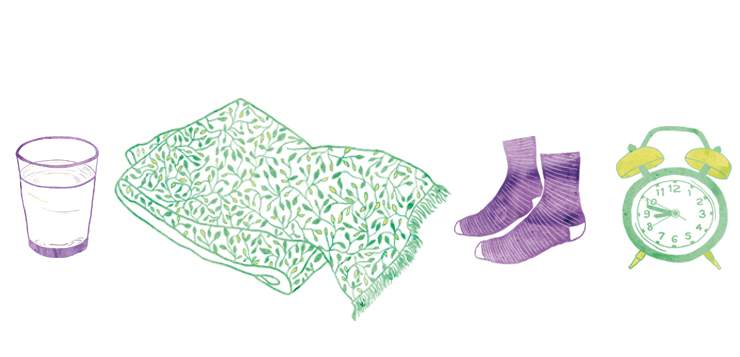
5 Tips for Basic Seated Meditation Posture
1) Seat
Keep your butt centered
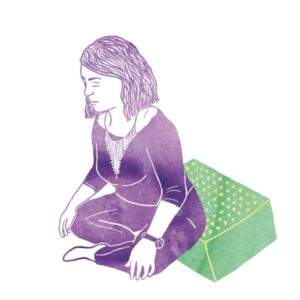
If your seat isn’t comfortable, the rest of your body will likely tense up, which makes meditating pretty difficult all around. Keep your butt in the center of the cushion or chair—if you’re too far forward your spine will arch to compensate; if you’re too far back it’ll curve forward.
When you first sit down, rock back and forth on your sitting bones to loosen up and find solid ground. From there, the rest of your posture will more easily fall into place.
Spine
Stay straight and relaxed
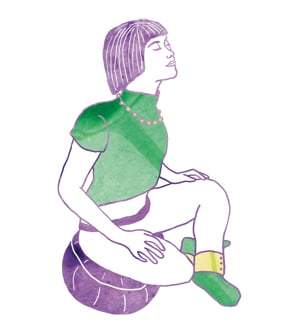
There are two main ways the spine gets out of whack during meditation: arching or slouching. When you have more than a natural arch, things stiffen and strain, and the mind is more likely to get frantic. On the flipside, it’s hard to feel present and alert when you’re slouched, your hands are sliding off your knees, and your chin is down. To align your spine, drape your body forward, then slowly straighten up, feeling each vertebra stack as you go.
Legs
Find the right height
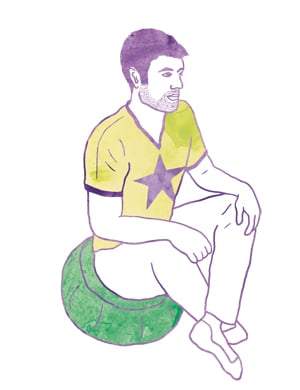
If your knees are above your thighs, your hips, back, and neck will strain. For the long-legged among us, this could mean finding a higher cushion.
Sitting in a Chair
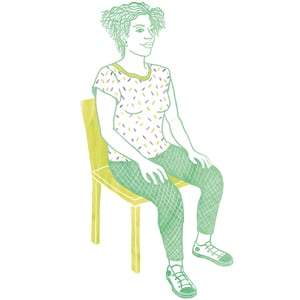
There are many reasons to meditate in a chair: it can be easier on the knees for those with joint pain; it’s convenient when traveling; most people have access to a chair even if they don’t have room for a cushion. If you do use a chair, resist the urge to rely too much on the chair’s back, unless you really need to. Doing so can cause you to let your spine go soft, making your breathing less open and inviting distraction and discomfort. And be sure to keep your feet flat on the floor. This may mean placing something under your feet if the chair is too high off the ground.
Resting Pose
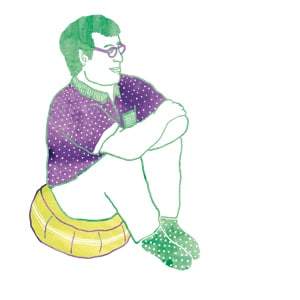
It’s OK to take a break from your meditation posture, especially during longer sessions. Try the resting pose pictured, bringing your knees to your chest, curving your spine forward.
Seating Options

Meditation benches allow you to sit in a relaxed kneeling position while keeping your posture aligned.
Rectangular cushions, or gomdens, are good for sitting cross-legged, and come in various heights and degrees of firmness.
Round cushions, or , are used for cross-legged sitting or, placed on their side, between the legs, for a kneeling posture.
This article appeared in the June 2017 issue of Mindful magazine.
The post How to Find the Right Meditation Posture for Your Body appeared first on Mindful.
from RSSMix.com Mix ID 8196908 https://www.mindful.org/find-right-meditation-posture-body/

No comments:
Post a Comment